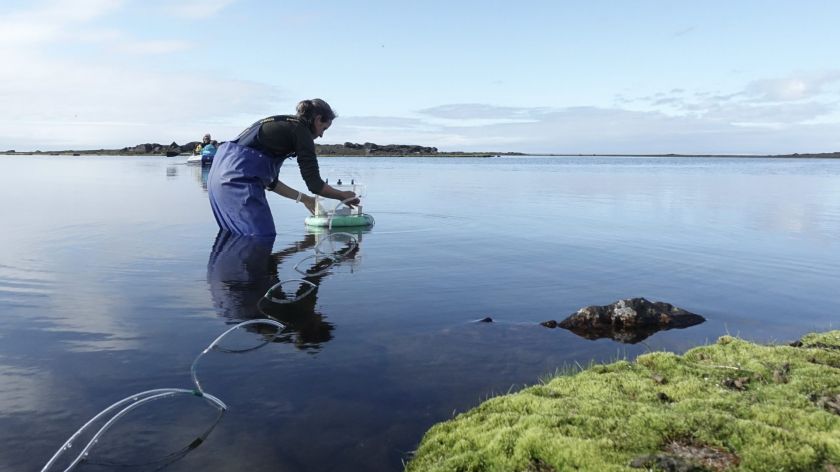Aquatic ecology and environmental biology more urgent than ever
-
 Aquatisch microbiologe Annelies Veraart onderzoekt methaanconcentraties in Spitsbergen. Foto: Rob Buiter
Aquatisch microbiologe Annelies Veraart onderzoekt methaanconcentraties in Spitsbergen. Foto: Rob Buiter
Researchers of Aquatic Ecology and Environmental Biology have their hands full with the major nitrogen problem that the Netherlands is facing. The department, which is celebrating its 50th anniversary today, made the case for a more serious approach, back in the 1980s and 1990s. 'Nitrogen emissions have been allowed to run its course.'
It is thanks to Kees den Hartog that in 1973, as a spin-off from Animal Ecology, the department of Aquatic Ecology was established in Nijmegen. ‘They were joined by Environmental Biology, thanks to research into acid rain by Jan Roelofs in the 1980s’, says Professor of Aquatic Ecology and Environmental Biology Leon Lamers.
At the time, acid rain was causing acidification and eutrophication in wet and dry nature, but even in the 1980s and 1990s, scientists already saw the scope of the nitrogen problem, says Lamers. ‘At the time, there was a large pushback on nitrogen emissions and certainly sulphur emissions. Nitrogen emissions ended up running its course, and with stricter regulations from the European Union, it is now much more in the news.’
Polluted Rhine River
The Sandoz chemical spill in 1986, during which the Rhine River was heavily polluted by an enormous amount of water mixed with chemicals, was also a reason for lots of research at the department. The Nijmegen scientists looked at the many invasive species that could be found in the changing ecosystem after this disaster.
There was, and still is, a lot of research in the department on biodiversity restoration through targeted measures. In the 1990s, Jan van Groenendael introduced the genetic component to this type of research.
‘We want to understand what happens in nature, but of course we are also always looking for solutions’, says associate professor and department head Sarian Kosten. ‘For instance, we are currently looking at how the Peel (national park in the southeast part of the Netherlands, ed.) is recovering after the fire in 2020 and whether we can aid that recovery. And we helped investigate whether the bracketing of the water in the Westzaan nature reserve has a beneficial effect on methane emissions, which turned out to be the case. We conduct subsidised research, but also receive questions from regional water authorities and nature managers. Some of those questions end up at B-WARE, a spinoff of our department. As academics, we like to latch onto their projects, which often provides valuable insights for all parties.’
‘In the Netherlands, we have the worst water quality in Europe’
Kosten explains how the researchers at the department work together with the Faculty of Science’s TechnoCentre, where several measuring systems were developed to continuously measure greenhouse emissions in water and on land. In particular, this concerns carbon dioxide, methane and nitrous oxide. The ultimate goal is not only to quantify emissions, but also to understand which processes are driving them. At best, this will provide methods to reduce degradation. One of the department’s many studies is measuring methane concentrations in the bottom of freshwater lakes in Svalbard by Annelies Veraart.
Emissions
Current and future nature issues will create a lot of work and possibly further growth for the department. Lamers: ‘There needs to be more research on pollution of surface waters and wetlands, combating subsidence in peatlands and greenhouse gas emissions from lakes and fens, and applications of plants in water purification.’
Researchers predict the nitrogen problem will not be solved in the next few years. And water quality will then also need to be addressed further, for both nitrogen and phosphate. Leon Lamers: ‘In the Netherlands, we have the worst water quality in Europe. The manure that goes in also causes greenhouse gas emissions from the water again. A lot of research still needs to be done on wetland restoration, where the knowledge can be implemented immediately.’
The anniversary will be celebrated with a symposium at the Lindenberg entitled: Past, present and future of wetland functioning and restoration.
Translated by Jan Scholten




